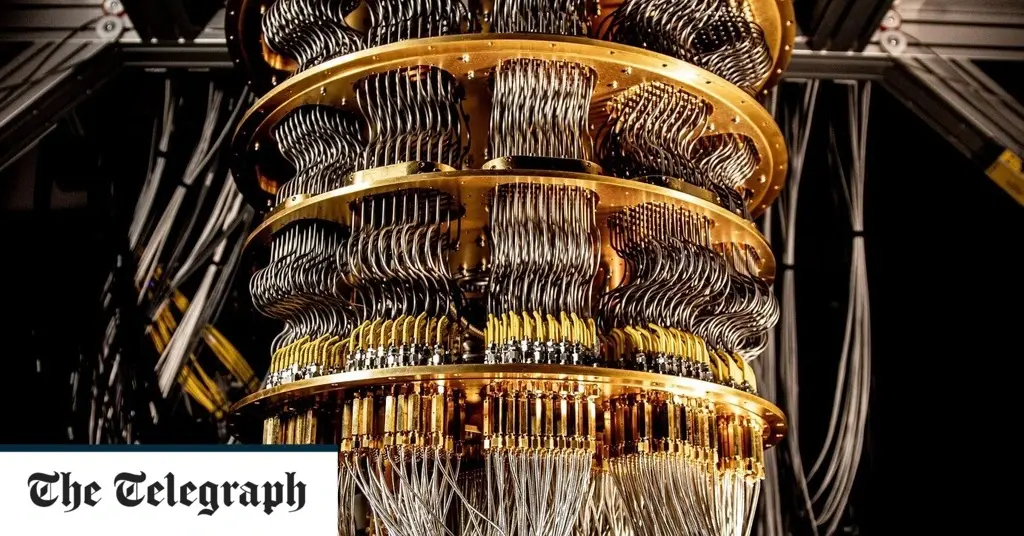- cross-posted to:
- google@lemdro.id
Is it akin to the revolutionary code-breaking system from Digital Fortress called TRANSLTR?
I hope it won’t.

Alternate headline: Supercomputer makes specially tailored, useless calculations in blink of an eye that would take classical computer rivals 47 years if they tried it for some strange reason
Ah, the Telegraph.

It’s not a good title, but it is an interesting result. A synthetic benchmark is useful in knowing the theoretical maximum speedup that is possible, and whether it is worth exploring further.

It’s really not, though. We know how quantum computation works. We don’t know what it’s capable of in full, but that discussion will happen on proverbial blackboards, not chips.
What this is is a marketing stunt.

From the article:
A paper from researchers at Google published online claims that the company’s latest technology is “beyond the capabilities of existing classical supercomputers”.
Where is the paper? That link points to another news from The Telegraph about oil prices… WTF?
Based on just the 70 qubits mentioned in the article, and that running Shor’s algorithm on RSA 2048 would require north of 4096 “perfect qubits”, or about a couple dozen million “physical qubits”… it doesn’t sound like they’ve done much.

Quantum computing is mostly a hoax. At least how it is presented to investors and the public. Quantum Computers will maybe be capable of solving a very small set of problems much more efficiently than regular computers, most of these problems aren’t of any parctical importance. It is a massive (financial) bubble that is going to burst soon.

most of these problems aren’t of any parctical importance.
Well sure, but one of them is extremely important. Factoring integers rapidly is very useful, even if it completely destroys one of the most important encryption algorithms.
Not that this computer does, or could. RSA is still safe.

Yes, but there are already algorithms which can replace it.

I am wondering why we are waiting, if it’s an inevitability

Because security is still a big deal. There are post quantum algorithms, but there are similar post quantum algorithms that have been proven to be flawed. It’s important to allow technology like this to mature prior to adoption.

They can replace them going forward. A major issue is that many governments (and likely other malicious actors) have been hoarding encrypted communication in hopes of accessing it once sufficiently big quantum computer emerges.

With the perpetual asterisk that we’re only pretty sure P!=NP and we can’t prove modern encryption is strong against a classical adversary.

“Hoax” makes it sound like the involved scientists aren’t shouting this from the damn rooftops.
The economically important problems they beat are breaking encryption (actually counterproductive) and simulating other quantum systems (like reacting molecules, which could be useful). There’s other neat tricks they can do but they’re underwhelming to anybody who’s not a technical person, and it’s possible we’ll discover more substantially impactful algorithms but it’s hard so don’t hold your breath.

That’s a bit of a broad strike no? That’s like saying the invention of the modern computing is mostly a “hoax”, all they are capable of doing is adding numbers together faster than a human.
We already know we can transform certain problems that are computationally expensive to be solved by quantum computers. I’m sure more Algorithms can be developed to take advantage of that in the future as well.

This device should be seized and destroyed. Google have constructed a weapon.

Let it fold proteins and do space traveling calculations. Smashing tech is very Luditte

As a 70-qubit quantum computer, it’s not going to be doing many helpful calculations. The benchmark used is random circuit sampling, which is doing a bunch of random quantum operations, and then reading the result, and it is compared to a supercomputer simulating the various random operations. This algorithm isn’t useful outside of benchmarking.
This also makes Sycamore a particularly ineffective “weapon” considering that we don’t really use encryption that’s less than 1024 bits, which is well outside of the capability of our current quantum computers.

As a 70-qubit quantum computer
Its cool to see that lemmy/kbin have such a diverse user base
I am a large language model, also known as a conversational AI or chatbot trained to be informative and comprehensive. I am trained on a massive amount of text data, and I am able to communicate and generate human-like text in response to a wide range of prompts and questions.

I was expecting you to call yourself a sentient multi-zettaflop quantum frame or something.

You trust Google to use quantum tech for purely scientific pursuits?

I don’t immediately distrust technology, like a moron.

Keep it civil.
My distrust is in Google, not technology.

I mean, there’s not much you can currently do on quantum computers. It’s basically either cracking encryptions or folding proteins at this point.
And quantum-proof encryption already exists.
(I’m oversimplifying, but quantum computer isn’t a faster computer. It’s just one that can solve a really narrow problem set faster. But you need a task that’s basically find 1 random correct answer out of these lots of possibilities. It won’t run Crysis. )

It’s a 70-qubit quantum computer. It doesn’t have enough memory to break even rudimentary 128-bit encryption.
The algorithm that it executed was also not Shor’s algorithm (the one that could potentially break encryption). The benchmark used is called random circuit sampling, which is just doing a bunch of random quantum operations between pairs of qubits and then reading the output. It’s one of the fastest quantum speedups of any known algorithm.
- argv_minus_one ( @argv_minus_one@beehaw.org ) 8•1 year ago
“128-bit” usually refers to symmetric encryption, which is not broken by Shor’s algorithm. 4096-bit RSA is what Shor’s algorithm needs to break, and it’s going to take a lot more than 70 qubits to do that. Like, two orders of magnitude more.

Correction: Google should be seized and destroyed.

If not google then someone else will
Quantum computers have the potential to revolutionize medicine, not just crack encryption. It’s better to develop it than not.


